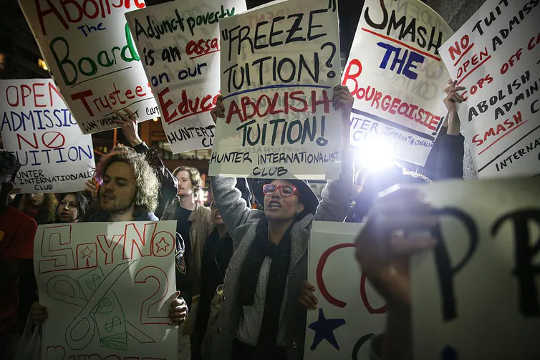
Students pulling a heavy ball representing the total outstanding student debt in the U.S. at over $1.5 trillion. PAUL J. RICHARDS/AFP via Getty Images
President-elect Joe Biden promised to forgive at least some student debt during his campaign, and he now supports immediately canceling US$10,000 per borrower as part of COVID-19 relief measures.
Such proposals are likely to be quite popular. A poll from 2019 found that 58% of voters support canceling all federal student debt.
But there are those who question the idea of debt forgiveness and call it unfair to those who never took out student debt or already paid it off.
As an ethicist who studies the morality of debt, I see merit in the question: Should student debt be canceled?
The moral case against canceling
Educational debt is often regarded as an investment in one’s future. Millennials with a B.A., for instance, typically earn $25,000 more than those with a high school diploma. College education is also generally correlated with a variety of positive life outcomes, including physical and mental health, family stability and career satisfaction.
Given the benefits of college education, canceling student debt appears to some as a giveaway for those who are already on their way to becoming well-off.
Canceling debt also seems to violate the moral principle of following through on one’s promises. Borrowers have a moral duty to fulfill their loan agreements, the philosopher Immanuel Kant argued, because reneging on promises is disrespectful to oneself and others. Once people have promised to do something, he noted, others rely upon that promise and expect them to follow through.
In the case of federal student loans, a borrower signs a promissory note agreeing to pay back the government and, ultimately, the taxpayers. And so student borrowers seem to have a moral duty to pay their debts unless mitigating circumstances like injury or illness arise.
The moral case for canceling
Fairness and respect, however, also demand that society addresses the magnitude of student debt today, and especially the burdens it imposes on low-income, first-generation and Black borrowers.
Young people today start their adult lives burdened with much more student debt than previous generations. Almost 70% of college students now borrow to attend college, and the average size of their debt has risen since the mid-90s from less than $13,000 to about $30,000 today.
As a result, total outstanding student debt has jumped to over $1.5 trillion, making it the second largest form of debt in the U.S. after mortgages.
This explosion in student debt raises two significant moral concerns, as my student Justin Lewiston and I argue in an article published last month by The Journal of Value Inquiry.
The first concern is that the distribution of costs and benefits is very unequal. Fairness requires equal opportunity, as the philosopher John Rawls argued. Yet, while borrowing for education is supposed to create opportunities for students from disadvantaged backgrounds, those opportunities often fail to materialize due to educational challenges and wage gaps in the labor market.

Students hold a demonstration in New York to protest against ballooning student loan debt. Photo by Cem Ozdel/Anadolu Agency/Getty Images
Data show that low-income students, first-generation students and Black students face much greater struggles in repaying their loans. About 70% of those in default are first-generation students, and 40% come from low-income backgrounds. Twenty years after college, when white borrowers have repaid 94% of their loans, the typical Black student has been able to repay only 5%.
These repayment and default rates reflect significantly lower graduation rates for students in those groups, who typically need to work long hours while also in school and hence engage less with both the academic and nonacademic aspects of college.
But they also reflect significantly lower post-graduation incomes for such students, due in no small part to continuing social and racial wage gaps in the labor market. Black men with a bachelor’s degree make, on average, more than 20% less than white men with the same education and experience, though that wage gap is smaller for women. And first-generation graduates typically make 10% less than students whose parents graduated from college.
A second moral concern is that student debt is increasingly causing widespread distress and constraining life choices in significant ways. Consider that even before the pandemic, 20% of student borrowers were behind on their payments, and first-generation borrowers and borrowers of color are struggling even more.
The financial distress indicated by this high rate of delinquency is undermining both the physical and mental health of young adults. It prevents young adults from starting families, purchasing cars, renting or buying their own homes and even starting new businesses.
Unsurprisingly, these negative effects are disproportionately experienced by first-generation, low-income and Black student borrowers, whose life choices are especially restricted by the need to make loan payments.
Avoiding moral hazard
Some analysts have argued, however, that canceling student debt will create a problem of moral hazard. A moral hazard arises when people no longer feel the need to make careful choices because they expect others to cover the risk for them.
For example, a bank that expects to be bailed out by the government in the event of a financial crisis thereby has an incentive to engage in riskier behavior.
Moral hazard can be avoided by combining student debt cancellation with programs that reduce the need for future borrowing, especially for first-generation students, low-income students and students of color.
One success story is the Tennessee Promise, a program enacted in 2015 to make tuition and fees at community and technical colleges free to state residents. This program has increased enrollment, retention and completion rates, while reducing borrowing by over 25%.
Ultimately, morality requires a forward-looking as well as a backward-looking approach to debt cancellation.
Looking backward at initial promises to repay can explain why people are generally required to pay their debts. But looking forward will enable policymakers to imagine how canceling student debt could help create a fairer society.
About the Author
Kate Padgett Walsh, Associate Professor of Philosophy, Iowa State University
This article is republished from The Conversation under a Creative Commons license. Read the original article.
Recommended books:
Capital in the Twenty-First Century
by Thomas Piketty. (Translated by Arthur Goldhammer)
 In Capital in the Twenty-First Century, Thomas Piketty analyzes a unique collection of data from twenty countries, ranging as far back as the eighteenth century, to uncover key economic and social patterns. But economic trends are not acts of God. Political action has curbed dangerous inequalities in the past, says Thomas Piketty, and may do so again. A work of extraordinary ambition, originality, and rigor, Capital in the Twenty-First Century reorients our understanding of economic history and confronts us with sobering lessons for today. His findings will transform debate and set the agenda for the next generation of thought about wealth and inequality.
In Capital in the Twenty-First Century, Thomas Piketty analyzes a unique collection of data from twenty countries, ranging as far back as the eighteenth century, to uncover key economic and social patterns. But economic trends are not acts of God. Political action has curbed dangerous inequalities in the past, says Thomas Piketty, and may do so again. A work of extraordinary ambition, originality, and rigor, Capital in the Twenty-First Century reorients our understanding of economic history and confronts us with sobering lessons for today. His findings will transform debate and set the agenda for the next generation of thought about wealth and inequality.
Click here for more info and/or to order this book on Amazon.
Nature's Fortune: How Business and Society Thrive by Investing in Nature
by Mark R. Tercek and Jonathan S. Adams.
 What is nature worth? The answer to this question—which traditionally has been framed in environmental terms—is revolutionizing the way we do business. In Nature’s Fortune, Mark Tercek, CEO of The Nature Conservancy and former investment banker, and science writer Jonathan Adams argue that nature is not only the foundation of human well-being, but also the smartest commercial investment any business or government can make. The forests, floodplains, and oyster reefs often seen simply as raw materials or as obstacles to be cleared in the name of progress are, in fact as important to our future prosperity as technology or law or business innovation. Nature’s Fortune offers an essential guide to the world’s economic—and environmental—well-being.
What is nature worth? The answer to this question—which traditionally has been framed in environmental terms—is revolutionizing the way we do business. In Nature’s Fortune, Mark Tercek, CEO of The Nature Conservancy and former investment banker, and science writer Jonathan Adams argue that nature is not only the foundation of human well-being, but also the smartest commercial investment any business or government can make. The forests, floodplains, and oyster reefs often seen simply as raw materials or as obstacles to be cleared in the name of progress are, in fact as important to our future prosperity as technology or law or business innovation. Nature’s Fortune offers an essential guide to the world’s economic—and environmental—well-being.
Click here for more info and/or to order this book on Amazon.
Beyond Outrage: What has gone wrong with our economy and our democracy, and how to fix it -- by Robert B. Reich
 In this timely book, Robert B. Reich argues that nothing good happens in Washington unless citizens are energized and organized to make sure Washington acts in the public good. The first step is to see the big picture. Beyond Outrage connects the dots, showing why the increasing share of income and wealth going to the top has hobbled jobs and growth for everyone else, undermining our democracy; caused Americans to become increasingly cynical about public life; and turned many Americans against one another. He also explains why the proposals of the “regressive right” are dead wrong and provides a clear roadmap of what must be done instead. Here’s a plan for action for everyone who cares about the future of America.
In this timely book, Robert B. Reich argues that nothing good happens in Washington unless citizens are energized and organized to make sure Washington acts in the public good. The first step is to see the big picture. Beyond Outrage connects the dots, showing why the increasing share of income and wealth going to the top has hobbled jobs and growth for everyone else, undermining our democracy; caused Americans to become increasingly cynical about public life; and turned many Americans against one another. He also explains why the proposals of the “regressive right” are dead wrong and provides a clear roadmap of what must be done instead. Here’s a plan for action for everyone who cares about the future of America.
Click here for more info or to order this book on Amazon.
This Changes Everything: Occupy Wall Street and the 99% Movement
by Sarah van Gelder and staff of YES! Magazine.
 This Changes Everything shows how the Occupy movement is shifting the way people view themselves and the world, the kind of society they believe is possible, and their own involvement in creating a society that works for the 99% rather than just the 1%. Attempts to pigeonhole this decentralized, fast-evolving movement have led to confusion and misperception. In this volume, the editors of YES! Magazine bring together voices from inside and outside the protests to convey the issues, possibilities, and personalities associated with the Occupy Wall Street movement. This book features contributions from Naomi Klein, David Korten, Rebecca Solnit, Ralph Nader, and others, as well as Occupy activists who were there from the beginning.
This Changes Everything shows how the Occupy movement is shifting the way people view themselves and the world, the kind of society they believe is possible, and their own involvement in creating a society that works for the 99% rather than just the 1%. Attempts to pigeonhole this decentralized, fast-evolving movement have led to confusion and misperception. In this volume, the editors of YES! Magazine bring together voices from inside and outside the protests to convey the issues, possibilities, and personalities associated with the Occupy Wall Street movement. This book features contributions from Naomi Klein, David Korten, Rebecca Solnit, Ralph Nader, and others, as well as Occupy activists who were there from the beginning.
Click here for more info and/or to order this book on Amazon.

























